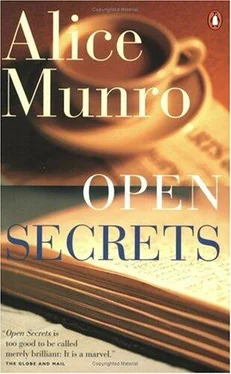It was one of the things the Franciscan tried so hard to prevent — the selling of women to Muslim men. It put him into a frenzy, that their religion could be so easily set aside. They sold girls like Lottar, who would bring no price anywhere else, and widows who had borne only girls.
Slowly and sulkily the women removed all the rich clothes. They brought out men’s trousers, worn and with no braid, and a shirt and head scarf. Lottar put them on. One woman with an ugly pair of shears chopped off most of what remained of Lottar’s hair, which was difficult to cut because of the dressing.
“Tomorrow you would have been a bride,” they said to her. Some of them seemed mournful, some contemptuous. “Now you will never have a son.”
The little girls snatched up the hair that had been cut off and struck it on their heads, arranging various knots and fringes.
Lottar swore her oath in front of twelve witnesses. They were, of course, all men, and looked as sullen as the women about the turn things had taken. She never saw the Muslim. The Franciscan berated the men and said that if this sort of thing did not stop he would close up the churchyard and make them bury their dead in unholy ground. Lottar sat at a distance from them all, in her unaccustomed clothes. It was strange and unpleasant to be idle. When the Franciscan had finished his harangue, he came over and stood looking down at her. He was breathing hard because of his rage, or the exertions of the lecture.
“Well, then,” he said. “Well.” He reached into some inner fold of his clothing and brought out a cigarette and gave it to her. It smelled of his skin.
A nurse brought in Charlotte’s supper, a light meal of soup and canned peaches. Charlotte took the cover off the soup, smelled it, and turned her head away. “Go away, don’t look at this slop,” she said. “Come back tomorrow — you know it’s not finished yet.”
The nurse walked with me to the door, and once we were in the corridor she said, “It’s always the ones with the least at home who turn the most critical. She’s not the easiest in the world, but you can’t help kind of admiring her. You’re not related, are you?”
Oh, no, I said. No.
“When she came in it was amazing. We were taking her things off and somebody said, oh, what lovely bracelets, and right away she wanted to sell them! Her husband is something else. Do you know him? They are really quite the characters.”
Charlotte’s husband, Gjurdhi, had come to my bookstore by himself one cold morning less than a week earlier. He was pulling a wagon full of books, which he had wrapped up in a blanket. He had tried to sell me some books once before, in their apartment, and I thought perhaps these were the same ones. I had been confused then, but now that I was on my own ground I was able to be more forceful. I said no, I did not handle secondhand books, I was not interested. Gjurdhi nodded brusquely, as if I had not needed to tell him this and it was of no importance to our conversation. He continued to pick up the books one by one, urging me to run my hands over the bindings, insisting that I note the beauty of the illustrations and be impressed by the dates of publication. I had to repeat my refusal over and over again, and I heard myself begin to attach some apologies to it, quite against my own will. He chose to understand each rejection as applying to an individual book and would simply fetch out another, saying vehemently, “This, too! This is very beautiful. You will notice. And it is very old. Look what a beautiful old book!”
They were travel books, some of them, from the turn of the century. Not so very old, and not so beautiful, either, with their dim, grainy photographs. A Trek Through the Black Peaks. High Albania. Secret Lands of Southern Europe .
“You will have to go to the Antiquarian Bookstore,” I said. “The one on Fort Street. It isn’t far to take them.”
He made a sound of disgust, maybe indicating that he knew well enough where it was, or that he had already made an unsuccessful trip there, or that most of these books had come from there, one way or another, in the first place.
“How is Charlotte?” I said warmly. I had not seen her for a while, although she used to visit the store quite often. She would bring me little presents — coffee beans coated with chocolate to give me energy; a bar of pure glycerine soap to counteract the drying effects, on the skin, of having to handle so much paper. A paperweight embedded with samples of rocks found in British Columbia, a pencil that lit up in the dark (so that I could see to write up bills if the lights should go out). She drank coffee with me, talked, and strolled about the store, discreetly occupied, when I was busy. Through the dark, blustery days of fall she wore the velvet cloak that I had first seen her in, and kept the rain off with an oversized, ancient black umbrella. She called it her tent. If she saw that I had become too involved with a customer, she would tap me on the shoulder and say, “I’ll just silently steal away with my tent now. We’ll talk another day.”
Once, a customer said to me bluntly, “Who is that woman? I’ve seen her around town with her husband. I guess he’s her husband. I thought they were peddlers.”
Could Charlotte have heard that, I wondered. Could she have detected a coolness in the attitude of my new clerk? (Charlotte was certainly cool to her.) There might have been just too many times when I was busy. I did not actually think that the visits had stopped. I preferred to think that an interval had grown longer, for a reason that might have nothing to do with me. I was busy and tired, anyway, as Christmas loomed. The number of books I was selling was a pleasant surprise.
“I don’t want to be any kind of character assassin,” the clerk had said to me. “But I think you should know that that woman and her husband have been banned from a lot of stores in town. They’re suspected of lifting things. I don’t know. He wears that rubber coat with the big sleeves and she’s got her cloak. I do know for sure that they used to go around at Christmastime and snip off holly that was growing in people’s gardens. Then they took it round and tried to sell it in apartment buildings.”
On that cold morning, after I had refused all the books in his wagon, I asked Gjurdhi again how Charlotte was. He said that she was sick. He spoke sullenly, as if it were none of my business.
“Take her a book,” I said. I picked out a Penguin light verse. “Take her this — tell her I hope she enjoys it. Tell her I hope she’ll be better very soon. Perhaps I can get around to see her.”
He put the book into his bundle in the wagon. I thought that he would probably try to sell it immediately.
“Not at home,” he said. “In the hospital.”
I had noticed, each time he bent over the wagon, a large, wooden crucifix that swung down outside his coat and had to be tucked back inside. Now this happened again, and I said, thoughtlessly, in my confusion and contrition, “Isn’t that beautiful! What beautiful dark wood! It looks medieval.”
He pulled it over his head, saying, “Very old. Very beautiful. Oak wood. Yes.”
He pushed it into my hand, and as soon as I realized what was happening I pushed it back.
“ Wonderful wood,” I said. As he put it away I felt rescued, though full of irritable remorse.
“Oh, I hope Charlotte is not very sick!” I said.
He smiled disdainfully, tapping himself on the chest — perhaps to show me the source of Charlotte’s trouble, perhaps only to feel for himself the skin that was newly bared there.
Then he took himself, the crucifix, the books, and the wagon out of my store. I felt that insults had been offered, humiliations suffered, on both sides.
Читать дальше












